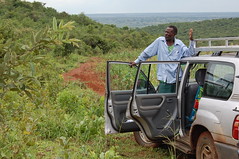Who is Lord of the Rain?
Heavy rains can be an inconvenience to our life here. Our laundry never has time to dry on the clothesline. The unpredictable electricity becomes more so. The slow internet stops working entirely. And the dirt roads turn into mud bogs.
Two weeks ago, while sliding on a wet path, I struck a sharp rock, puncturing the sidewall of one my tires. I struggled to get the Landcruiser to a safe, dry place for a tire change. Not long afterwards, the windshield wiper, fatigued from pushing mud out of my view, decided to break off (thankfully I found the main parts, and patched the wiper together with an old bicycle spoke, a.k.a. village duct tape).
But when I arrived at Nyabusang'wa with a mud-covered car, they were not sympathetic to my struggle to arrive at their church service. Rather, they were jealous of the other places that had obviously seen rain that had not reached their fields. It was a sentiment that could have been shared by nearly all of our churches—the current rains are two months late.
For our churches, this is a crisis, as people are struggling to make their food stores last until March, the earliest possible time for a harvest. And it is a spiritual ordeal, as some village leaders are coercing every household to contribute money for a sacrifice to the traditional rainmakers.
On this day, I preached a sermon that I’ve never heard in the states: Who is Lord of the Rain? People were very engaged as we compared biblical stories like Noah, Elijah, Job 37-38, Psalm 29, and Jesus in the storm with traditional beliefs of rain-making kings and droughts caused by social sin (like the birthing of twins). When we came to the question, “therefore, who should we turn to when we are concerned about rain?”, the answer was universal: “Mulungu”—the Sukuma word for God.
Of greater significance was the lunchtime conversation with three church leaders, as we talked about issues ranging from leadership, church discipline, and measuring the health of the churches in their cluster. This was the more significant aspect of my day--while I can occasionally come and teach about an issue like rain, it is these leaders that minister daily to new Christians struggling to keep their faith through times of trial.
(in addendum—we have experienced two weeks of heavy rain since this church visit. While our clothes are a little musty, we are thankful for the blessing sent by the Lord of the Rain.)
Heavy rains can be an inconvenience to our life here. Our laundry never has time to dry on the clothesline. The unpredictable electricity becomes more so. The slow internet stops working entirely. And the dirt roads turn into mud bogs.
Two weeks ago, while sliding on a wet path, I struck a sharp rock, puncturing the sidewall of one my tires. I struggled to get the Landcruiser to a safe, dry place for a tire change. Not long afterwards, the windshield wiper, fatigued from pushing mud out of my view, decided to break off (thankfully I found the main parts, and patched the wiper together with an old bicycle spoke, a.k.a. village duct tape).
But when I arrived at Nyabusang'wa with a mud-covered car, they were not sympathetic to my struggle to arrive at their church service. Rather, they were jealous of the other places that had obviously seen rain that had not reached their fields. It was a sentiment that could have been shared by nearly all of our churches—the current rains are two months late.
For our churches, this is a crisis, as people are struggling to make their food stores last until March, the earliest possible time for a harvest. And it is a spiritual ordeal, as some village leaders are coercing every household to contribute money for a sacrifice to the traditional rainmakers.
On this day, I preached a sermon that I’ve never heard in the states: Who is Lord of the Rain? People were very engaged as we compared biblical stories like Noah, Elijah, Job 37-38, Psalm 29, and Jesus in the storm with traditional beliefs of rain-making kings and droughts caused by social sin (like the birthing of twins). When we came to the question, “therefore, who should we turn to when we are concerned about rain?”, the answer was universal: “Mulungu”—the Sukuma word for God.
Of greater significance was the lunchtime conversation with three church leaders, as we talked about issues ranging from leadership, church discipline, and measuring the health of the churches in their cluster. This was the more significant aspect of my day--while I can occasionally come and teach about an issue like rain, it is these leaders that minister daily to new Christians struggling to keep their faith through times of trial.
(in addendum—we have experienced two weeks of heavy rain since this church visit. While our clothes are a little musty, we are thankful for the blessing sent by the Lord of the Rain.)



0 Comments:
Post a Comment
<< Home